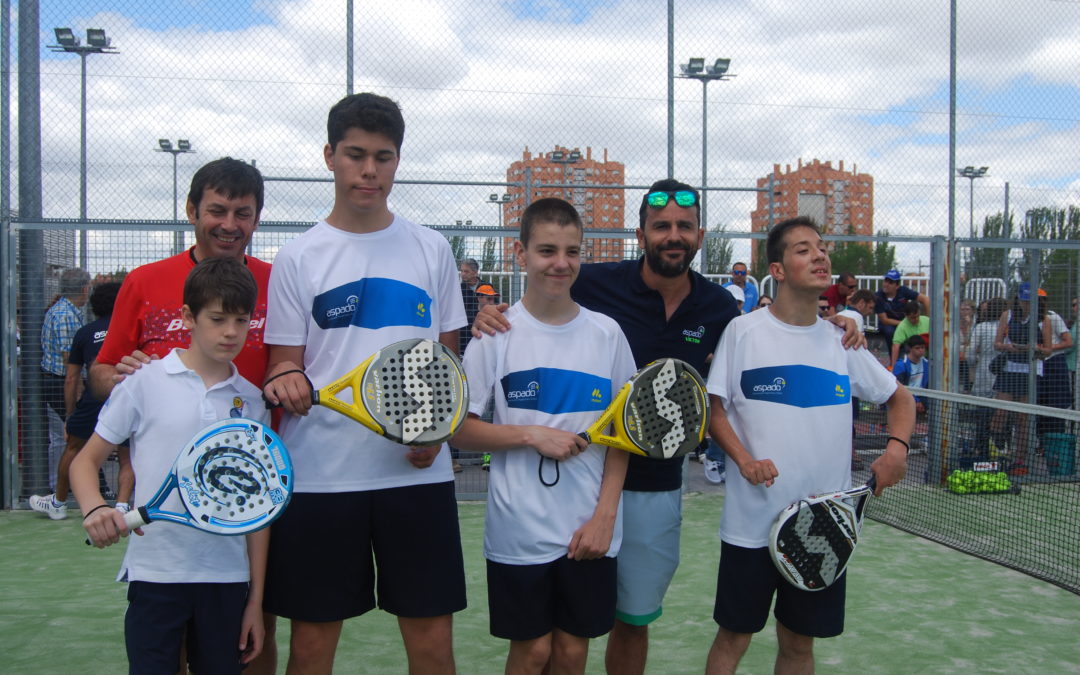Interview with Víctor Orea, coordinator of ASPADO monitors
He has been working for the Association for almost a decade. Víctor Orea is the coordinator of ASPADO monitors and the person who is aware of the work carried out in each of the schools.
He has worked for the Red Cross and other associations, but it is here at ASPADO where he found the “perfect cocktail” in 2007 by combining his passion for paddle tennis with his desire to help other people.
How does your relationship with ASPADO begin?
In 2007 I was looking online for courses to continue training as a conventional paddle coach and I came across the first course that ASPADO did for adapted paddle tennis monitors. As soon as I saw it I did not hesitate for a second and I did. Being able to give something of myself to help these people and still in the sport that I like was a perfect cocktail.
At the end of the course, I continued going to the schools that ASPADO had in Madrid to continue training and gain experience.
Shortly after, Kiki de la Rocha called me to join the team leading the Adult School of the University of Alcalá de Henares and together with Carlos, former coordinator of monitors, the Momo nursery school in Alcalá.
What is basically the task that you carry out in the Association?
I am currently the coordinator of all the Aspado schools and I am teaching classes in 4 schools in Madrid. But in the end these are simply must-have titles for it to function properly. I want to emphasize that ASPADO is a team and we are all part of this great project.
We have a wonderful team, from the monitors who are working right now such as Montse Guillen, Alejandra Cardozo, Alba Robles, Antonio Chiarri, Manolo Bueno, Alvaro Bueno, Patricia Suárez, Marta González, Javier Escribano, Javier Souto, Borja López and César Vilasanchez; as the presidents of each delegation, Tinita Manrrique in Aspado CyL, Begoña de la Rocha in Andalusia, Carlos García in Castilla La Mancha, Patricia Suárez in the Canary Islands, Miguel Martínez in Galicia, and obviously Kiki de la Rocha, our president and founder of the Association. But we cannot forget all the monitors who have worked with us, the partners, the students, the collaborating companies. All have made it possible for ASPADO to be today the international benchmark for adapted paddle tennis.
What requirements must be met to be a monitor of the Association? What is valued in addition to the title?
The main requirement that must be had is the vocational one, having the desire to be able to help others to have a better life, never losing that desire and illusion to help. See them how they are happy with the little that you give them, how it helps them in their life in all aspects and at the same time everything that one learns from them every day.
In addition to the adapted paddle tennis instructor course that we do at ASPADO twice a year (May and September), you must obviously have knowledge of paddle tennis. As an interesting fact, I can say that a more precise ball launch is required than a conventional paddle tennis class.
I would say that the title is only the beginning, because the important thing later is the training and the experience that one gains by attending our classes in the different schools.
From the people's perspective, yours is not an easy task, teaching and working with people with disabilities, how do you deal with it?
I would say that it is neither easy nor difficult, it is simply to want to help, to do things well and to be well prepared.
We have a methodology that works perfectly. We try to make the classes as similar to a conventional paddle class, adapting the exercises to each type of adult or child. We treat them like any type of person, because for us they are like that, with the same rights, needs, desire to learn and have fun.
Of course, as I have said before, preparation is essential, knowing everything about your student, knowing their disabilities, their needs and from there looking for the best way to work with them. Evolution, as in all people, is slower in some than in others, but for us it is just as rewarding.
It is not disability that makes life difficult, but the thoughts and actions of others.
What primary assessment is made of students to find out their abilities?
We do not structure classes in schools by type of disability, but by level of paddle tennis and motor skills.
In our schools, in each class, you can find a person with Down syndrome, an autistic person, another with Angelman or Williams syndrome, and other cases, but we evaluate their skills on the track and we change the classes as they acquire more. level on the paddle.
I always say that the worst disability is not realizing that we are all the same.
I encourage all these people, both adults and children, do not hesitate to ask for information either by entering our website (www.padeladaptado.com) where they will find all kinds of information or by calling 622-402-086. Let them come to our schools and try, to realize that in addition to learning they can have fun.
We will never know what we are capable of if we do not dare to try. Disability is not about resigning or denying its existence, it is about learning to live with it.
The next ASPADO monitors course It will take place in May and registrations are now open. You can consult all the details of this call on this web page.



